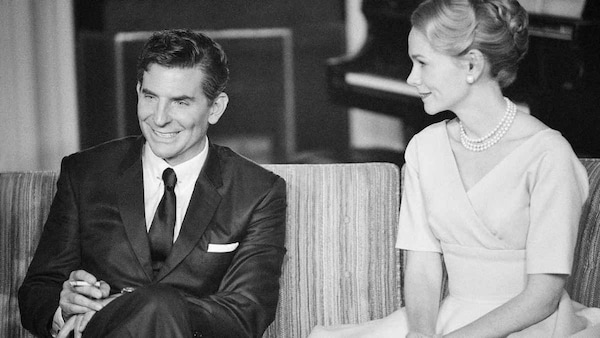Maestro Review: Carey Mulligan shines the brightest in stunted Leonard Bernstein biopic
The Bradley Cooper directorial is emotionally unsatisfying, hollow and contrived in design

Last Updated: 07.05 PM, May 10, 2024
Story: Directed by Bradley Cooper, Maestro centres on the decade spanning relationship and eventual marriage between the legendary American conductor, Leonard Bernstein (Cooper) and Felicia Montealegre (Carey Mulligan).
Review: There’s little in Maestro that truly reverberates with life or even anything that shows a curiosity about people. This is one of the most striking failures of the film especially since it foregrounds the story of someone who couldn’t, as he himself says, help but love and be drawn to as many people as he could. The legendary composer-conductor is depicted having this great passion for people of all stripes and backgrounds, hosting lavish parties and continually striking bonds with diverse, fresh talents. Despite attaining the height of fame, Bernstein swirls through encounters with new minds, openly accepting and embracing them. He isn’t cooped up in some ivory tower of privilege that his pioneering stardom grants him, instead looking upon interactions with people as the source of replenishment for both his art and life. As a scene spells it out, he is a man who so hates being alone he even leaves his bathroom door open.

This leads me to wonder. Where is that passion for life and people, so hopelessly unmeasured it is never too far from wrecking him, in Maestro? One of the biggest flaws of the screenplay, which Cooper co-wrote with Josh Singer, is it lazily harps on just a few establishing notes as a way of acquainting us with the essence of Bernstein. Early in the film, Bernstein tells his soon-to-be-wife Felicia he finds it deplorable that the world expects us to be just one thing. With his roots as a Russian orthodox Jew, Bernstein blazes through the American scene, bolstered by Felicia. It is she who teaches and pushes him to listen and pursue his bursting, uncontainable talent. The couple first connect on this ground that both are composites of many things. However, the film chooses to steamroll this aspect through a lens that solely verbalises this plurality but never dives in. Felicia is originally from Chile, which is used in a scene for her contribution to his composition. The gaze on plurality of man is arguably the most contentious zone of interest that takes shape in Maestro.

The decade-spanning Leonard-Felicia love story is the entry point the film chooses in going into the mind of the man. Theirs is a romance that weathers the roughest patches. Right from the spark of their first encounter, where they just click and know they are meant for one another, we get a glimpse of a relationship that starts with both claiming and owning to the other’s secrets and unflappable habits. Not long after their first few meetings the film hints Felicia isn’t naïve or oblivious about Bernstein’s bisexuality. She instinctively senses his guilt about forsaking David (Matt Bomer), with whom he was previously in a relationship, cheerfully nudging and reminding him everyone should be free to live as they please. Felicia almost prides on being tolerant and accepting of Bernstein’s flings with other men, shielded by her conviction that he is above everything solely devoted to her. This comforts and anchors her. Yet she is barely prepared for how severely she will be rocked when she directly witnesses her husband flirting with Tommy (Gideon Glick) at a party. Initially she doesn’t admit the hurt. In fact she opts to stay in denial about her honest emotional responses to his frequent infidelity. Bernstein sees how crushed she is yet he rather brusquely swats her anxiety aside in a conversation, where he posturing encourages her to share her feelings but barely caring to give her time as he rushes off to finish another of his compositions.

For a film that is ostensibly positioned as a two-hander between Mulligan and Cooper, Maestro struggles and fumbles to capture what drives either of their individual characters. When they are together, the performances keep us gripped and invested. Mulligan especially pumps soul and gusto into the film despite the screenplay consistently failing to adequately etch Felicia. In a glorious performance that hijacks the film, wrestling our attention away from Bernstein to focus on the cost of his indecision and the inordinate care he demanded of her, Mulligan is shattering. A latter scene with Bernstein, where Felicia finally explodes, letting out all that she has long kept repressed and making him confront essential truths of himself he denies existing, seems to be a lock-in for Mulligan’s third Oscar nomination. Watch her in the quieter scenes as betrayal, devastation and fear hover on her face. All Felicia asks her husband is to be discreet. The actress brings a stolidity and a strength of character to Felicia.
While the film does extract some lovely moments of the couple, there is also an odd hastiness with which it sweeps past the times they drifted apart. When it swoops on the two finding their way back to each other, Felicia reassuring him that there is no hate in his heart and the two reconcile after he has just conducted, the emotional effect of their reuniting is somewhat dulled because it is tailed by his rousing conducting where Bernstein seems to be calling out to and summoning some divine force. There were moments when I wished this were a miniseries instead of a film because the weight of the decades upon the relationship never quite registers. The film shunts a considered peek into how Felicia’s acting career eventually took a backseat to buttress Bernstein’s. A telling moment comes up when it is she who has got his whole schedule memorised, not him. It is suggested she sort of re-ignites the acting stint when she sets her distance from him. However, it comes off as too brief and cursory; the prosthetic ageing is also too terribly distracting, especially Cooper’s.

Verdict: Ultimately, Maestro feels too affected and gets caught up in being so stately that the characters stagnate and don’t deepen beyond those first few establishing beats. Cooper strains to evoke high emotion but I emerged from the film cold and feeling none the wiser about either Bernstein, the wellspring of his genius or how his incredible love story with Felicia managed to sustain and outgrow each of his many contradictions. Maestro never fully touches the complexity, layers and the tension jostling within one person.

 Premium
Premium